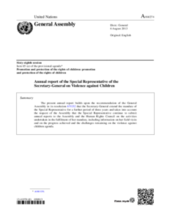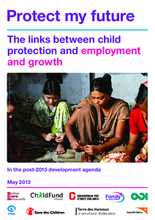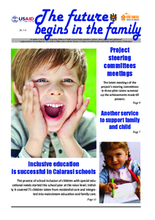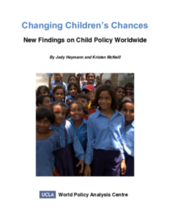Displaying 381 - 390 of 496
This study funded by Big Lottery and undertaken in partnership between the University of Bristol and Buttle UK, a grant-giving charity for vulnerable children, aims to fill gaps in understanding about the experiences of children living with kins, and in particular how children in informal kinship care view their situation.
In her annual report to the UN General Assembly, the Special Representative of the Secretary-General highlights the results of an expert consultation on violence in early childhood. The consultation highlighted the urgency of supporting families and caregivers in their child-rearing responsibilities and securing a responsive national child protection system to strengthen families’ capacity to raise young children in safe environments and prevent child abandonment and placement in residential care.
This article outlines an approach to assessing the quality of relationships between young foster children and their carers.
This report presents the results of an exploratory study on education for children in care in Ireland. The overarching aim of this study is to identify how the Irish education system can best support attendance, participation and attainment in education by children in care.
This paper was commissioned by Family for Every Child and is part of an inter-agency series on the links between child protection and major development goals. This report focuses on the links between child protection and economic growth.
This 5-minute animated video depicts a theory of change for achieving breakthrough outcomes for vulnerable children and families. It describes the need to focus on building the capabilities of caregivers and strengthening the communities that together form the environment of relationships essential to children’s lifelong learning, health, and behavior.
This issue No. 3-4 is one in a newsletter series concerning care reform in Moldova. The magazine was produced by Partnerships for Every Child (P4EC), an NGO in Moldova, with funding from the project, “Protecting children in Moldova from family separation, violence, abuse, neglect and exploitation.”
This new report by the World Policy Analysis brings together key findings from the book, Children’s Chances: How Countries Can Move From Surviving and Thriving, providing a global picture of what laws, policies, and programs countries have in place to address areas vital to children’s healthy development.
Zero to Three, a US based non profit organization working to inform, train and support professionals, policy makers and parents to improve the lives of infants and toddlers, combined the evidence from research on early childhood development with feedback from focus groups with families, friends, and neighbors who act as care givers to develop a range of practical resources to strengthen care practices with children between the ages of 0 and 3.
Using data from three rounds of the Young Lives longitudinal survey conducted in 2002, 2006, and 2009 in Ethiopia, this paper investigates whether the death of a parent during middle childhood has different effects on a child’s schooling and psychosocial outcomes when compared with death during adolescence.




